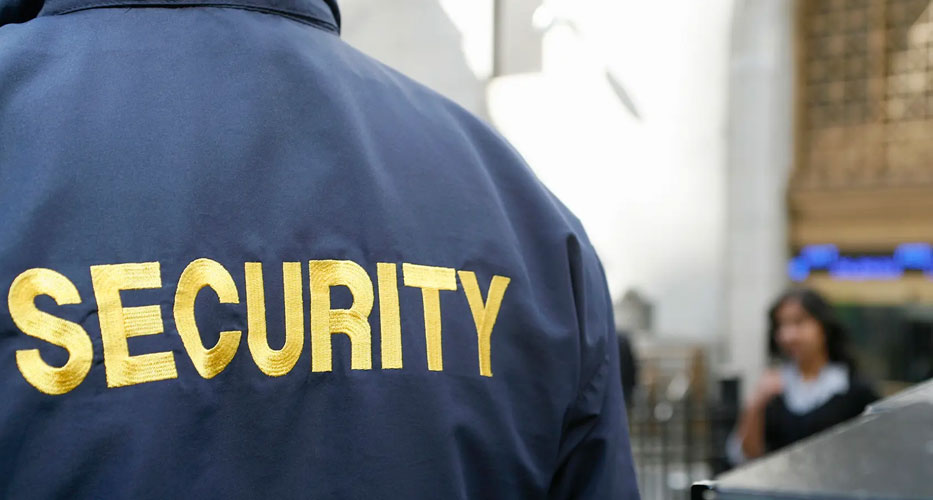The minute-to-minute actions and responsibilities of a security officer vary greatly depending upon the post. A guard may be…
- Checking visitor credentials at the corporate reception desk or guard house at the entrance to a gated residential community.
- Watching a bank of video surveillance monitors for suspicious guest activity in a casino security operations room, or in a command center coordinating responses to remote sites when criminal activity has been spotted.
- Observing patrons and customers at retail stores, museums, and art galleries, inspecting bags, and looking for threats of shoplifting.
- Managing admissions, guiding event-goers through metal detectors, performing crowd control, and directing traffic at large games, concerts, and fairs.
- Monitoring attendees at theme parks for unruly behavior and/or first aid or crisis intervention (like a lost child).
- Posted to a manufacturing plant, public utility, or piece of critical infrastructure that has specific emergency evacuation protocols in the event of an accident.
- Standing post at a bank or credit union on the lookout for robbers.
- Patrolling the property and its perimeters – either on foot or in a vehicle – of construction sites, auto dealerships, shopping malls, corporate business parks, manufacturing facilities, distribution centers, etc., where assets are left outdoors after business hours to guard against theft and vandalism.
- Assigned to a school to monitor campus grounds and building entrances against the threat of armed intruders.
- Performing access control in the lobby of marijuana dispensary where only a limited number of customers are allowed inside while watching for suspicious individuals.
But What Are The Duties of a Security Officer?
You can probably think of a hundred more scenarios. But the bottom line is that whether inspecting credentials at corporate reception, checking ticket holders for contraband at the stadium entrance, or making sure no one bangs on the shark tank glass at the aquarium, the core responsibilities of a security officer rarely change. A good security guard will…
- Provide a strong visual presence and deterrent against crime and violence.
- Always be vigilant for suspicious behaviors of surrounding people.
- Protect the assets at the jobsite against theft and damage.
- Understand specific emergency procedures and how to enforce safety precautions as directed by the customer.
- Ensure the employer’s rules for proper guest/customer behavior are being followed, like no smoking, for example.
- Know how to maintain order and enforce crowd control in the event of an emergency.
- Offer first-line assistance and/or be able to administer first aid in a medical emergency.
- Be able to physically separate, restrain, and detain offenders until help arrives from law enforcement authorities.
- Recognize when and how to call for backup or assistance from local enforcement.
- Accurately document any incident and capture all participant(s) information for legal, insurance, or security audit purposes.
What Skills Do Security Guards Need?
The best security officer applicants will therefore possess the following qualities and traits:
- Strength and physical stamina. There may be long periods of standing and walking, and in the event of a physical altercation, the guard must be ready and able to intervene.
- Keen sense of judgement. Almost a sixth sense for when something seems odd, whether that is a person acting suspiciously or in need of help, an object left unattended, a vehicle that shouldn’t be there, or a sound or smell that just isn’t quite right.
- Visible yet approachable. A physical presence will be a visible deterrent to crime and may discourage customers from making a scene, but the guard should also be compassionate enough to help guests in need, like the parent searching for a lost child.
- Quick-thinking. The ability to act quickly in a crisis is key; to be able to prioritize tasks, to recognize a medical emergency, to keep your cool when those about you are panicked, and to know when to call for help.
- A strong stomach. Security guards are almost always first on-scene because, well, that’s their job. But rushing to the scene of an accident is not the time find out your guard faints at the sight of blood.
- Technically proficient. Today’s guards must know how to use surveillance technology, radios, and tablets for reviewing post orders and creating incident reports.
- Communication skills. Guards must be able to understand and follow through with their assigned post orders, and clearly articulate instructions to guests, employees, or customers at the worksite, especially in emergency situations. They must be able to explain activities to supervisors and law enforcement when calling for assistance, and be able to write incident reports that accurately depict the cause and order of events.
- Patience. When posted to a remote site, a security guard can be a lonely job, mostly boring but occasionally interrupted by a few moments of excitement. It could be days or weeks between activity. On the other hand, guards posted to a site with crowds of people need to possess de-escalation skills and know how to control themselves when dealing with difficult or inebriated customers before resorting to physical force.
It’s not always the biggest, strongest, or most intimidating-looking candidates that make the best security guards (although that sometimes helps); rather it is a combination of strength, compassion, awareness, and communication that best gets the job done.
It all starts with a solid foundation of training, understanding the rules and responsibilities of being a private security officer – as well as the legal limits of those powers. At Defencify, that’s exactly what we do. Our online self-paced security guard training platform will help you build a licensed workforce that has the skills needed for long term success. Visit us at www.defencifytraining.com to learn more.
